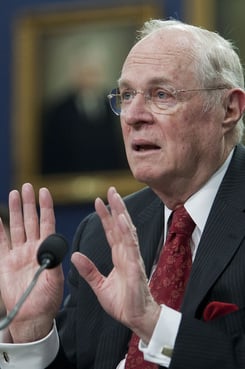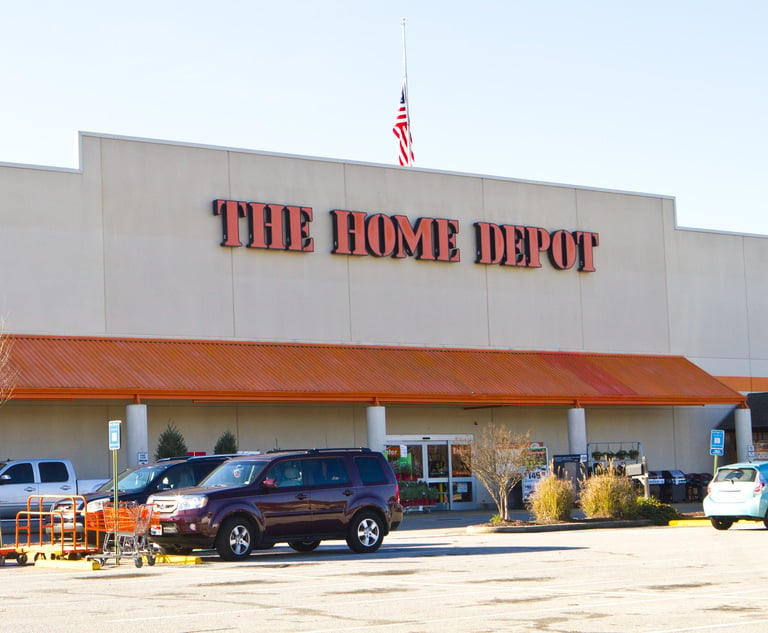Justices Rule for Colorado Baker Who Refused to Make a Cake for Gay Wedding
"Whatever the confluence of speech and free exercise principles might be in some cases, the Colorado Civil Rights Commission's consideration of this case was inconsistent with the state's obligation of religious neutrality," Kennedy wrote for the 7-2 court.
June 04, 2018 at 10:36 AM
6 minute read
 Human Rights Campaign held a press conference outside the U.S. Supreme Court in October prior to delivering an amicus brief supporting gay couples in Masterpiece Cakeshop. Credit: Diego M. Radzinschi
Human Rights Campaign held a press conference outside the U.S. Supreme Court in October prior to delivering an amicus brief supporting gay couples in Masterpiece Cakeshop. Credit: Diego M. Radzinschi
Updated at 12:46 p.m. EST
A divided U.S. Supreme Court on Monday ruled for a Colorado baker who refused on religious grounds to make a custom wedding cake for a same-sex couple.
In Masterpiece Cakeshop v. Colorado Civil Rights Commission, the 7-2 majority, led by Justice Anthony Kennedy, said the state commission's order that baker Jack Phillips “cease and desist” discriminating against same-sex couples violated his First Amendment right of free exercise of religion.
 Justice Anthony Kennedy
Justice Anthony Kennedy“Whatever the confluence of speech and free exercise principles might be in some cases, the Colorado Civil Rights Commission's consideration of this case was inconsistent with the state's obligation of religious neutrality,” Kennedy wrote. “The reason and motive for the baker's refusal were based on his sincere religious beliefs and convictions.”
Kennedy also made clear the decision was relevant for this case only. “The outcome of cases like this in other circumstances must await further elaboration in the courts, all in the context of recognizing that these disputes must be resolved with tolerance, without undue disrespect to sincere religious beliefs, and without subjecting gay persons to indignities when they seek goods and services in an open market,” he wrote.
During oral arguments in the case, Kennedy was visibly angry about the disparaging comments made by a commissioner when the state commission held its hearing on the discrimination charge.
Kennedy, who has authored key Supreme Court decisions favoring gay rights, stated in his opinion, “Our society has come to the recognition that gay persons and gay couples cannot be treated as social outcasts or as inferior in dignity and worth. For that reason the laws and the Constitution can, and in some instances must, protect them in the exercise of their civil rights.”
But he added, “At the same time, the religious and philosophical objections to gay marriage are protected views and in some instances protected forms of expression.”
Justice Ruth Bader Ginsburg dissented, joined by Justice Sonia Sotomayor. Ginsburg said the commission's actions “do not evidence hostility to religion of the kind we have previously held to signal a free-exercise violation, nor do the comments by one or two members of one of the four decisionmaking entities considering this case justify reversing the judgment below.”
In 2012, Charlie Craig and David Mullins visited the Masterpiece bakery and asked its owner, Phillips, to create a cake for their wedding. Phillips declined, saying he did not make cakes for same-sex weddings because of his Christian beliefs and because same-sex marriage was not then legal in Colorado.
Craig and Mullins filed a complaint with the Colorado Civil Rights Commission, alleging discrimination on the basis of their sexual orientation. The state public accommodations law, similar to laws in 22 states, prohibits any place of business engaged in sales to the public from discriminating on the basis of disability, race, creed, color, sex, sexual orientation, marital status, national origin, or ancestry.
The commission and later the Colorado Court of Appeals ruled in favor of the two men. The Colorado Supreme Court denied Masterpiece Cake's request for further review.
In the high court, Phillips, represented by Kristen Waggoner of Alliance Defending Freedom, argued that applying the state anti-discrimination law violated both his speech and religious exercise rights under the First Amendment.
David Cole, national legal director of the American Civil Liberties Union, argued on behalf of Craig and Mullins. Colorado Solicitor General Frederick Yarger argued for the state commission. In a statement, Craig and Mullins said: “Today's decision means our fight against discrimination and unfair treatment will continue. We have always believed that in America, you should not be turned away from a business open to the public because of who you are.”
Louise Melling, deputy legal director of the ACLU, said in a statement:
“The court reversed the Masterpiece Cakeshop decision based on concerns unique to the case but reaffirmed its longstanding rule that states can prevent the harms of discrimination in the marketplace, including against LGBT people.”
Phillips drew support from the Trump administration's Justice Department. In a friend-of-the-court brief, the U.S. Solicitor General's Office argued that the justices could decide the case on the speech claim alone.
U.S. Attorney General Jeff Sessions said in a statement:
“We are pleased with today's Supreme Court decision. The First Amendment prohibits governments from discriminating against citizens on the basis of religious beliefs. The Supreme Court rightly concluded that the Colorado Civil Rights Commission failed to show tolerance and respect for Mr. Phillips' religious beliefs. In this case and others, the Department of Justice will continue to vigorously defend the free speech and religious freedom First Amendment rights of all Americans.”
During high court arguments in December, the justices seemed closely divided, with those on the left deeply skeptical of Phillips' speech claim and those on the right more sympathetic to his religion claim.
A number of justices raised concerns about where to draw the line as to which types of speech are protected. Justice Stephen Breyer said at the time, “We want some kind of distinction that won't undermine every civil rights law including African-Americans, Hispanic Americans, including everybody who has been discriminated against in very basic things of life, food, design of furniture, homes and buildings.”
The intense interest in the case was reflected in the overflow crowd outside of the high court on argument day as well as by the outpouring of supporting briefs on each side. Fifty amicus briefs were filed in support of Phillips; 45 amicus briefs supported the same-sex couple.
The Supreme Court's ruling in Masterpiece Cakeshop is posted below:
This report was updated with comment about the Supreme Court's ruling.
Read more:
'How Do You Draw a Line?' Key Moments From the Supreme Court's Wedding Cake Case
Justices Shut Down DOJ's Drive to Punish ACLU Lawyers in Abortion Case
Justice Department, Divided Internally, Backed Colorado Baker Over Gay Couple
Veteran SCOTUS Advocate Allyson Ho Jumps to Gibson Dunn From Morgan Lewis
Justices Won't Review Challenges to Mississippi's Anti-Gay Law
This content has been archived. It is available through our partners, LexisNexis® and Bloomberg Law.
To view this content, please continue to their sites.
Not a Lexis Subscriber?
Subscribe Now
Not a Bloomberg Law Subscriber?
Subscribe Now
NOT FOR REPRINT
© 2025 ALM Global, LLC, All Rights Reserved. Request academic re-use from www.copyright.com. All other uses, submit a request to [email protected]. For more information visit Asset & Logo Licensing.
You Might Like
View All
Is 1st Circuit the New Center for Trump Policy Challenges?

Insurance Policies Don’t Cover Home Depot's Data Breach Costs, 6th Circuit Says

'Religious Discrimination'?: 4th Circuit Revives Challenge to Employer Vaccine Mandate
2 minute read
Standing Spat: Split 2nd Circuit Lets Challenge to Pfizer Diversity Program Proceed
Trending Stories
- 1The Rise and Risks of Merchant Cash Advance Debt Relief Companies
- 2Ill. Class Action Claims Cannabis Companies Sell Products with Excessive THC Content
- 3Suboxone MDL Mostly Survives Initial Preemption Challenge
- 4Paul Hastings Hires Music Industry Practice Chair From Willkie in Los Angeles
- 5Global Software Firm Trying to Jump-Start Growth Hands CLO Post to 3-Time Legal Chief
Who Got The Work
J. Brugh Lower of Gibbons has entered an appearance for industrial equipment supplier Devco Corporation in a pending trademark infringement lawsuit. The suit, accusing the defendant of selling knock-off Graco products, was filed Dec. 18 in New Jersey District Court by Rivkin Radler on behalf of Graco Inc. and Graco Minnesota. The case, assigned to U.S. District Judge Zahid N. Quraishi, is 3:24-cv-11294, Graco Inc. et al v. Devco Corporation.
Who Got The Work
Rebecca Maller-Stein and Kent A. Yalowitz of Arnold & Porter Kaye Scholer have entered their appearances for Hanaco Venture Capital and its executives, Lior Prosor and David Frankel, in a pending securities lawsuit. The action, filed on Dec. 24 in New York Southern District Court by Zell, Aron & Co. on behalf of Goldeneye Advisors, accuses the defendants of negligently and fraudulently managing the plaintiff's $1 million investment. The case, assigned to U.S. District Judge Vernon S. Broderick, is 1:24-cv-09918, Goldeneye Advisors, LLC v. Hanaco Venture Capital, Ltd. et al.
Who Got The Work
Attorneys from A&O Shearman has stepped in as defense counsel for Toronto-Dominion Bank and other defendants in a pending securities class action. The suit, filed Dec. 11 in New York Southern District Court by Bleichmar Fonti & Auld, accuses the defendants of concealing the bank's 'pervasive' deficiencies in regards to its compliance with the Bank Secrecy Act and the quality of its anti-money laundering controls. The case, assigned to U.S. District Judge Arun Subramanian, is 1:24-cv-09445, Gonzalez v. The Toronto-Dominion Bank et al.
Who Got The Work
Crown Castle International, a Pennsylvania company providing shared communications infrastructure, has turned to Luke D. Wolf of Gordon Rees Scully Mansukhani to fend off a pending breach-of-contract lawsuit. The court action, filed Nov. 25 in Michigan Eastern District Court by Hooper Hathaway PC on behalf of The Town Residences LLC, accuses Crown Castle of failing to transfer approximately $30,000 in utility payments from T-Mobile in breach of a roof-top lease and assignment agreement. The case, assigned to U.S. District Judge Susan K. Declercq, is 2:24-cv-13131, The Town Residences LLC v. T-Mobile US, Inc. et al.
Who Got The Work
Wilfred P. Coronato and Daniel M. Schwartz of McCarter & English have stepped in as defense counsel to Electrolux Home Products Inc. in a pending product liability lawsuit. The court action, filed Nov. 26 in New York Eastern District Court by Poulos Lopiccolo PC and Nagel Rice LLP on behalf of David Stern, alleges that the defendant's refrigerators’ drawers and shelving repeatedly break and fall apart within months after purchase. The case, assigned to U.S. District Judge Joan M. Azrack, is 2:24-cv-08204, Stern v. Electrolux Home Products, Inc.
Featured Firms
Law Offices of Gary Martin Hays & Associates, P.C.
(470) 294-1674
Law Offices of Mark E. Salomone
(857) 444-6468
Smith & Hassler
(713) 739-1250










